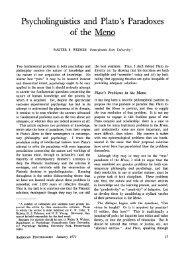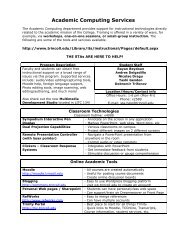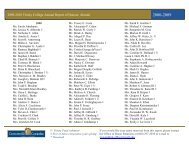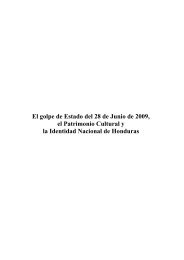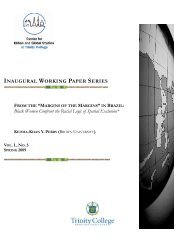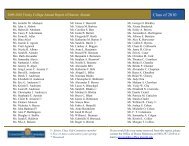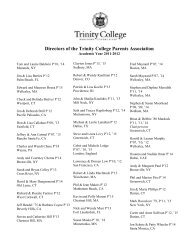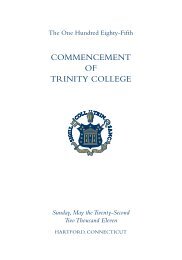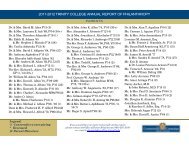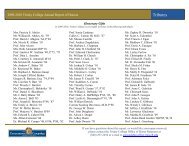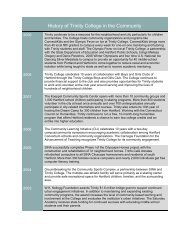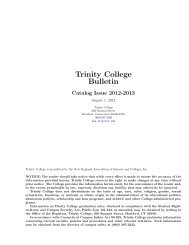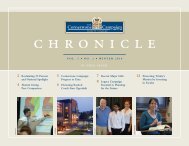Lifelong-Fall 2013.pdf - Trinity College
Lifelong-Fall 2013.pdf - Trinity College
Lifelong-Fall 2013.pdf - Trinity College
You also want an ePaper? Increase the reach of your titles
YUMPU automatically turns print PDFs into web optimized ePapers that Google loves.
FALL 2013<br />
The Academy of<br />
<strong>Lifelong</strong> Learning<br />
at <strong>Trinity</strong> <strong>College</strong><br />
An opportunity for adults to pursue new interests,<br />
expand intellectual horizons, and enrich their lives
The Academy of <strong>Lifelong</strong><br />
Learning at <strong>Trinity</strong> <strong>College</strong><br />
Open to adults of the community at large, the Academy<br />
of <strong>Lifelong</strong> Learning presents a series of minicourses on diverse<br />
and intellectually stimulating topics. Enrolled students have<br />
access to many <strong>Trinity</strong> <strong>College</strong> resources, including the Raether<br />
Center, for research. They also receive discounts at Cinestudio,<br />
Austin Arts Center, and <strong>Trinity</strong> <strong>College</strong> sporting events.<br />
Courses cover a wide range of interesting subjects taught<br />
by distinguished former and current <strong>Trinity</strong> faculty members.<br />
The hallmark of a <strong>Trinity</strong> education has long been the close<br />
interaction between professors and students, and the Academy<br />
of <strong>Lifelong</strong> Learning continues that tradition. Courses are<br />
taught in an engaging, collaborative manner, and there are<br />
opportunities to meet with fellow students and professors.<br />
Classes are conveniently scheduled for the late afternoon and<br />
early evening in classrooms easily reached from the center of<br />
the <strong>Trinity</strong> campus. Well-illuminated, secure parking is available<br />
on campus, within walking distance of classrooms.<br />
In addition, some classes are scheduled for the morning<br />
hours in attractive locations in the Greater Hartford vicinity.<br />
CO-DIRECTORS<br />
Frank Kirkpatrick, Ellsworth Morton Tracy Lecturer and<br />
Professor of Religion<br />
Patricia J. Bunker, Head Reference Librarian, Retired<br />
PROGRAM COORDINATOR<br />
Nancy Rossi<br />
COURSE FEES<br />
Courses meeting FOR:<br />
• four class sessions $ 85<br />
• five class sessions $105<br />
• six class sessions $125<br />
• eight-session Memoir Tutorial $300<br />
• Saturday Academy $125<br />
<strong>Trinity</strong> faculty and staff are eligible for a 10 percent discount.<br />
ENROLLMENT INFORMATION<br />
Academy of <strong>Lifelong</strong> Learning<br />
<strong>Trinity</strong> <strong>College</strong><br />
300 Summit Street<br />
Hartford, CT 06106<br />
(860) 297-2125<br />
lifelonglearning@trincoll.edu<br />
Gift certificates for the<br />
Academy of <strong>Lifelong</strong><br />
Learning are available<br />
and make a special gift<br />
for friends and family.
SATURDAY, NOVEMBER 16, 2013<br />
THE 1960s<br />
Coffee 8:30 a.m.<br />
Classes 9:00 a.m. to 4:00 p.m.<br />
Two morning sessions, lunch,<br />
and two afternoon sessions on the<br />
<strong>Trinity</strong> <strong>College</strong> campus<br />
“Civil Rights Revolution and<br />
Conservative Counterrevolution”<br />
Kevin McMahon<br />
9:00-10:15 a.m.<br />
“Vietnam: Children’s Crusade”<br />
Michael Heaney<br />
10:30-11:45 a.m.<br />
”Say It Loud: Music, Protest,<br />
and Politics”<br />
Scott Gac<br />
1:15-2:30 p.m.<br />
“No Turning Back?: The Women’s<br />
Movement After Fifty Years”<br />
Barbara Sicherman<br />
2:45-4:00 p.m.<br />
Special pricing for the daylong<br />
Saturday Academy and lunch.........$125<br />
1
The Academy of <strong>Lifelong</strong> Learning<br />
Off-Campus Courses<br />
Women and Politics<br />
This course explores the role of women<br />
in American politics from the early 20th<br />
century through the present day. We<br />
will examine the collective efforts made<br />
by American women to gain political<br />
rights, to secure favorable public policies,<br />
and to achieve an equal role for women<br />
in the political realm and society more broadly. We will try to<br />
understand how and why women’s political views, voting behavior,<br />
and rates of participation have changed over the 20th century and<br />
why they remain distinctive from men’s. In addition, we will explore<br />
ideological differences among women themselves. We end the course<br />
by studying women as politicians. We will assess the obstacles women<br />
face in getting elected or appointed to political positions, whether<br />
or not they act differently than their male counterparts, and the<br />
significance of their input in terms of public policy.<br />
Stefanie Chambers<br />
Four Mondays:1:00 p.m.-2:30 p.m.<br />
October 28; November 4, November 18, December 9<br />
(no class November 11-Veterans Day<br />
The McLean, 7 5 G r e a t P o n d R o a d , S i m s b u r y, C T 0 6 0 7 0<br />
Prophets or Messiahs: The<br />
Rise of Cults and Cultic<br />
Practices in the United States<br />
In the past decades, there have been more<br />
than 2,000 new cults in the United States.<br />
Some are led by prophets who conjure<br />
up visions of the imminent cataclysmic<br />
destruction of this world, which will usher the advent of a new<br />
dispensation. What are cults, and who are these leaders? Are they<br />
prophets or madmen? Why are their messages effective among so<br />
many, and who follows these leaders? Topics to be discussed include<br />
issues related to “programming” and “deprogramming,” spiritual<br />
healing, trance possession, and glossolalia (speaking in tongues).<br />
Leslie Desmangles<br />
Five Mondays:10:30 a.m.-noon<br />
October 7, 21, 28; November 4,11 (no class October 14-Columbus Day)<br />
Classes will be held The Heights at Avery Heights<br />
705 New Britain Avenue, Hartford, CT 06106<br />
2
The Emergence<br />
of Monotheism<br />
Though we may take for<br />
granted the fundamental<br />
premise of monotheism<br />
—the existence of but<br />
one god—it was not<br />
always so and, indeed, is<br />
not accepted in many<br />
parts of the world today.<br />
Monotheism, which is the<br />
foundation first of Judaism<br />
and then Christianity and Islam, is the gift of ancient Israel. This<br />
course will trace the emergence of monotheistic belief through<br />
the examination of ancient events and biblical texts. It is a journey<br />
of marvel combining the intricacies of intellectual history, human<br />
imagination, and poetic expression within the matrix of historical<br />
occurrence. The text for our study will be the Hebrew Bible.<br />
John A. Gettier<br />
Five Wednesdays: 7:00-8:30 p.m.<br />
October 2, 9, 16, 23, 30<br />
The McAuley, 275 Steele Road, West Hartford, CT 06117<br />
Søren<br />
Kierkegaard:<br />
The Scandal of<br />
Religious Belief<br />
and an Attack on<br />
Christendom<br />
Søren Kierkegaard was a<br />
19th century Danish thinker<br />
and writer. He is credited<br />
with one of the first developments of Christian existentialism. Best<br />
known for his books Fear and Trembling and The Sickness Unto Death,<br />
he penetrated deeply into the psychological depths of anxiety, faith,<br />
and the scandal of religious belief. This four-part series will explore<br />
his life, his writings on faith and religion, and his attack on the<br />
established church of Denmark.<br />
Frank Kirkpatrick<br />
Four Thursdays: 10:30 a.m-noon<br />
September 12, 19, 26; October 9<br />
Classes will be held at Lucy Robbins Welles Library,<br />
95 Cedar Street, Newington, CT 06111<br />
3
The Academy of <strong>Lifelong</strong> Learning<br />
Evening Campus Classes<br />
Five Characters in Search<br />
of a Culprit<br />
When last we followed the trail of murder,<br />
we were in Scandinavia. In this sequence of<br />
mysteries, we will encounter five fascinating<br />
characters, each with a distinct personality<br />
and approach to criminal investigation<br />
and each reflective of an ambient culture<br />
steeped in generations of experience. The sequence: Aimee Leduc<br />
in Paris; Hermes Diaktoros on an unnamed Greek Island; Inspector<br />
Van Veeteren, in Holland perhaps; Salvo Montalbano, certainly in<br />
Sicily; and, finally, Commander Adam Dalgleish on Combe Island<br />
off the Cornish Coast. As in the past, we will read with the intent<br />
of outwitting the sleuth, finding the clues, and providing a plausible<br />
account of the events in anticipation of the novel’s conclusion.<br />
Andrew De Rocco<br />
Five Wednesdays: 7:00-8:30 p.m.<br />
September 18, 25; October 2, 9, 16<br />
Required Texts (I’ve noted what I believe to be the ISBN codes for paperback editions,<br />
whenever available):<br />
Cara Black, Murder in the Bastille, SoHo Press, 2003, ISBN-13: 978-1-56947-364-1<br />
Anne Zouroudi, The Taint of Midas, Bloomsbury Publishing, 2009, ISBN: 978-0-7475-9616-5<br />
Häken Nesser, Mind’s Eye, Vintage, 2008, ISBN: 978-0-307-38722-6<br />
Andrea Camilleri, Rounding the Mark, Penguin, 2007, ISBN: 978-0-330-44725-6<br />
P. D. James, The Lighthouse, Vintage, 2005, ISBN: 978-0-307-27573-6<br />
Malory’s<br />
Le Morte Darthur<br />
Some of the most famous<br />
stories of the Middle Ages<br />
centered on Arthurian<br />
legend. But it wasn’t until<br />
the 15th century that,<br />
in England, one writer<br />
brought all the strands of<br />
this tradition together as he<br />
produced the first complete<br />
Arthuriad in the English<br />
tradition. In this course, we<br />
will study selected readings<br />
from Sir Thomas Malory’s<br />
Le Morte Darthur that range<br />
across the span of Arthur’s<br />
4
eign and Malory’s achievement, from Arthur’s ascent to the kingship<br />
to the final fate of Camelot. In the process, we will discuss the ways<br />
in which and reasons why Malory gives his own imprint to his<br />
legendary characters and plots.<br />
Sheila Fisher<br />
Six Wednesdays: 5:30-7:00 p.m.<br />
September 18, 25; October 2, 9, 16, 23<br />
Required Texts:<br />
Thomas Malory. Le Morte Darthur (Oxford), ISBN 978-0-19-953734-1<br />
Please note: You will receive a list of reading assignments for the whole<br />
course at the first class. For our first meeting, please read the “Introduction”<br />
and “How Uther Pendragon begot the Noble Conqueror King Arthur”<br />
(pages 3-32).<br />
Memoir Writing:<br />
Tell Your Own<br />
Story<br />
It’s the human condition:<br />
the desire to get down on<br />
paper the most memorable<br />
events of your life. That’s<br />
why almost every celebrity<br />
you can think of—from<br />
Andre Agassi to Tina Fey<br />
to Barack Obama—has at<br />
some point tried his or her hand at a memoir. That’s also why so<br />
many of our most beloved novels—To Kill a Mockingbird, The Catcher<br />
in the Rye—are very largely memoirs in disguise. We might want<br />
to tell our whole life story or just cherished moments (treasured<br />
memories of when our grown kids were little; a short, sweet<br />
interlude with a special<br />
pet; the most magical summer ever), but we all have recollections<br />
we want to pass on. Give in to that urge! Sit down at your<br />
computer, and start writing about yourself! Whether your motivation<br />
is to have a neatly packaged memoir to pass down to your children<br />
or grandchildren or a keepsake to enjoy for yourself—or to knock<br />
Neil Young and Pete Townshend and Rod Stewart off the best-seller<br />
list!—this course will help you do it. You’ll learn how to write<br />
easily and naturally, in your own voice, about your favorite subject:<br />
you.<br />
Hank Herman<br />
Eight Wednesdays: 5:30-7:30 p.m.<br />
October 9, 16, 23, 30; November 6, 13, 20; December 4<br />
This course will be limited to eight students. Due to the tutorial nature,<br />
extended length (eight weeks), and slightly longer classes (two hours),<br />
the fee for the course will be $300.<br />
5
Martha Risser<br />
Six Thursdays: 5:30-7:00 p.m.<br />
September 12,19, 26; October 3,10,17<br />
The Art of Dining In<br />
Classical Antiquity<br />
Drawing on evidence from art,<br />
archaeology, and literature, we<br />
will explore the cuisines and<br />
dining customs of Greco-Roman<br />
antiquity. Discussion topics will<br />
include private dinner parties,<br />
ritual feasting, medicinal diets,<br />
cultural stereotypes related to<br />
food and drink, and how their<br />
diets and table manners identified<br />
individuals as either civilized or<br />
savage.<br />
The Making of Modern India (1)<br />
The course will provide a sweeping look at Indian history<br />
from ancient times to the present, to show how the complex,<br />
often perplexing, Indian religious, social, and political traditions<br />
interacted with British imperialism to shape India’s unique path<br />
to independence and modernity. Lectures will discuss topics such<br />
as India’s great tradition, Britain’s legacy to the subcontinent, the<br />
pacifist struggle for independence, Hindu-Muslim relations and<br />
the founding of Pakistan, and, most importantly, how India, of all<br />
the other British colonies, came to be the only one to embrace<br />
democracy from the day it gained independence.<br />
A later course, “The Making of Modern India (2),” will provide<br />
a closer look at post-independence India.<br />
Ranbir Vohra<br />
Five Wednesdays: 5:30-7:00 p.m.<br />
September 11, 18, 25; October 2, 9<br />
6
Homer’s Iliad:<br />
The Tragedy of<br />
Achilles<br />
In Homer resides the<br />
soul of the Greek people.<br />
In fact, in his two epics<br />
are the seeds of Western<br />
culture and thought.<br />
The Iliad, for example,<br />
provided, among other<br />
things, the framework<br />
for tragedy as a dramatic<br />
genre as it ultimately<br />
blossomed in the fifth century B.C. theater in Athens. The first word<br />
of the Iliad is “rage,” (or “wrath” or “anger”). The last word of the<br />
first line is “of Achilles.” This “wrath of Achilles” colors almost every<br />
action in the epic. The impact of this wrath is felt not only by most<br />
of the important characters in the epic, but most especially and<br />
ultimately by Achilles himself. The scope of the epic is cosmic; gods,<br />
goddesses, and humans regularly commune and converse with one<br />
another. The ultimate playing field, however, is very personal, finite,<br />
and intimate.<br />
John C. Williams<br />
Six Mondays: 5:30-7:00 p.m.<br />
September 9, 16, 23, 30; October 7,<br />
21 (no class October 14-Columbus Day)<br />
Required Text:<br />
The Iliad, translated by Robert Fagles (Penguin Books, 1998),<br />
ISBN: 014 02.7536 3 (paperback)<br />
First Session Assignment:<br />
Read Bernard Knox’s introduction (pp.3-64) and Books 1-4 of The Iliad<br />
(pp. 7-163).<br />
7
FACULTY<br />
Stefanie Chambers is an associate professor of political science. Her<br />
teaching and research interests include: urban politics, racial and ethnic<br />
politics, and women and politics. She has written extensively on issues relating<br />
to urban education and urban public policy. Among other projects, she is<br />
currently writing an article on the gender gap in the 2012 presidential election.<br />
Chambers received her Ph.D. from The Ohio State University and started<br />
working at <strong>Trinity</strong> in 2000.<br />
Andrew De Rocco, a former dean of the faculty at <strong>Trinity</strong> and president<br />
of Denison University, has had a long and enduring interest in the mystery<br />
genre, in part resulting from a childhood discovery in his family’s library of a<br />
10-volume collection, The World’s Best One Hundred Detective Stories (Funk<br />
& Wagnalls, 1929). He received his doctorate from the University of Michigan,<br />
where he began his academic career before his appointment as Institute<br />
Professor of Molecular Physics at the University of Maryland. In addition to<br />
Maryland, he has held visiting appointments at the University of Colorado,<br />
at Tufts, and at Vanderbilt.<br />
Leslie Desmangles graduated from Eastern University in 1964 with a B.A.<br />
in music, from Palmer Seminary in Philadelphia with an M.Div. in theology,<br />
and from Temple University in 1975 with a Ph.D. in anthropology of religion,<br />
specializing in Caribbean and African studies. He has taught at Ohio Wesleyan<br />
University from 1969-1976, at DePaul University from 1976-1978, and at<br />
<strong>Trinity</strong> since 1978.<br />
Sheila Fisher, professor of English and former academic dean, received<br />
her B.A. summa cum laude with highest honors in English from Smith <strong>College</strong>,<br />
where she majored in English and Latin, and her M.A., M.Phil., and Ph.D.<br />
from Yale University. She joined the English Department at <strong>Trinity</strong> in 1984<br />
and served as chair of the department from 2005 to 2008. As a medievalist<br />
who specializes in Chaucer, late 14th-century English literature, and medieval<br />
women writers, she has published a book on Chaucer and articles on the<br />
Gawain poet and medieval romance, and co-edited a volume of feminist<br />
contextual essays on medieval and renaissance writings. Her latest book, The<br />
Selected Canterbury Tales: A New Verse Translation, was published by W. W.<br />
Norton in spring 2011.<br />
Scott Gac teaches a variety of courses in American cultural history at <strong>Trinity</strong><br />
<strong>College</strong> and is also chair of the American Studies Program. He has written on<br />
the antislavery movement, music and society, and the intellectual understandings<br />
of cultural power. His first book, Singing for Freedom: The Hutchinson Family<br />
Singers and the Nineteenth Century Culture of Antebellum Reform (Yale Press,<br />
2007), details the life and work of the Hutchinson Family Singers, the antislavery<br />
singing troupe and first commercially successful musicians of social protest in<br />
American history. Find out more about his recent talks and book news at his<br />
personal Web site, scottgac.com.<br />
John A. Gettier, professor of religion, emeritus, at <strong>Trinity</strong> <strong>College</strong>, retired in<br />
2001 after teaching for 35 years. With degrees from Wesleyan University, Yale<br />
University, and Union Theological Seminary in New York, he has taught a range<br />
of courses on biblical literature, specializing in apocalypticism, mythology,<br />
Hebrew narrative, and Hebrew language.<br />
Michael K. Heaney graduated from Middlebury <strong>College</strong>, Harvard Law<br />
School, and Rutgers University (Ph.D. in history, 2008, Uncounted Costs: the<br />
Civil War’s Impact on an Infantry Company’s Men and Their Families). He<br />
practiced law for 25 years before turning to teaching. He is a veteran of the<br />
Vietnam War, where he served as an infantry platoon leader. He continues<br />
working for the veteran community in various ways, including presenting<br />
papers and talks on war and peace issues and on veterans’ post-war adjustment<br />
issues. Heaney was interviewed on camera by Ken Burns for his Vietnam War<br />
documentary, planned for release in 2016, and he is currently writing a combat<br />
memoir.<br />
Hank Herman is an award-winning columnist and blogger who writes for<br />
the Westport News. He is also the author of Super Hoops (Bantam Doubleday<br />
Dell), a series of sports novels for children. His latest book, Accept My Kid,<br />
8
Please! A Dad’s Descent into <strong>College</strong> Application Hell (Da Capo Press, 2004)<br />
is a humorous memoir about the college admissions process. He also teaches<br />
writing at the University of Pennsylvania’s Kelly Writers House and at Norwalk<br />
Community <strong>College</strong>. He is a graduate of the University of Pennsylvania, where<br />
he majored in English.<br />
Frank G. Kirkpatrick is Ellsworth Morton Tracy Lecturer and Professor of<br />
Religion at <strong>Trinity</strong> <strong>College</strong>. Now on phased retirement, he has taught at <strong>Trinity</strong><br />
for more than 40 years with specialties in theology and social ethics. With<br />
Patricia J. Bunker, he is co-director of the Academy of <strong>Lifelong</strong> Learning.<br />
Kevin McMahon is the John R. Reitemeyer Professor of Political Science. His<br />
research examines the presidency and the political origins and consequences<br />
of Supreme Court decisions, covering a range of areas, including civil rights<br />
and liberties, constitutional law, school desegregation, political parties, and<br />
elections. His most recent book, Nixon’s Court: His Challenge to Judicial<br />
Liberalism and Its Political Consequences (University of Chicago Press, 2011),<br />
was selected as a 2012 Choice Outstanding Academic Title. His book,<br />
Reconsidering Roosevelt on Race: How the Presidency Paved the Road to<br />
Brown (University of Chicago Press, 2004), won the American Political Science<br />
Association’s Richard E. Neustadt Award for the best book published on the<br />
American presidency in 2004. He is also the co-author/co-editor of three<br />
books on the presidency and presidential elections and author of several book<br />
chapters and journal articles.<br />
Martha Risser is the Classics Department chair. She teaches courses on<br />
ancient art, archaeology, Greek, Latin, and classical civilization. She received<br />
her Ph.D. from the University of Pennsylvania, and her scholarly interests focus<br />
on classical art and archaeology, especially Greek pottery. She has participated<br />
in archaeological projects in Greece, Israel, Turkey, Italy, and the United States,<br />
and she currently conducts research at the Corinthian—a controlled sanctuary<br />
at the Isthmus. She is the author of Corinth Volume VII Part V Corinthian<br />
Conventionalizing Pottery (American School of Classical Studies Publications,<br />
Princeton, 2001). Risser also participates in the Akko Archaeology, Heritage<br />
and History Project, which includes a field school. Whenever possible, she<br />
takes <strong>Trinity</strong> students with her on her archaeological expeditions.<br />
Barbara Sicherman writes about women, privileged and not, real (Jane<br />
Addams, Ida B. Wells, Edith and Alice Hamilton, Charlotte Perkins Gilman)<br />
and imagined (Jo March, Marjorie Morningstar). Her recent book, Well-Read<br />
Lives, tells moving stories of how young women born in Victorian times lost--<br />
and found--themselves in books and worked out a life purpose around them.<br />
By discovering the meaning of reading to women in the past, today’s readers<br />
can gain insight into their own lives. A professor emerita at <strong>Trinity</strong> <strong>College</strong>, the<br />
author lives in West Hartford, Connecticut, with her Maine Coon cat, Sascha.<br />
Ranbir Vohra, Charles A. Dana Professor of Political Science, Emeritus,<br />
at <strong>Trinity</strong> <strong>College</strong>, began his career as a program officer in All India Radio<br />
in 1946; his work in AIR for the next 18 years gave him an insider’s view of<br />
political developments in the subcontinent from the gaining of independence in<br />
1947 to the end of the Nehru era. In 1964, he left AIR for Harvard University<br />
and on completing his Ph.D. degree in East Asian studies, he taught at Harvard<br />
(at the invitation of the Harvard History Department) before coming to <strong>Trinity</strong>,<br />
from where he retired in 1997. In addition to The Making of India (third<br />
edition, 2013), Vohra is the author of several books, including China’s Path to<br />
Modernization (third edition, 2000) and China: The Search for Social Justice<br />
and Democracy (Penguin/Viking Books: India, England, Australia, Canada,<br />
New Zealand, and USA, 1990/1991).<br />
John C. Williams is Hobart Professor of Classics, Emeritus, at <strong>Trinity</strong> <strong>College</strong>,<br />
where he taught Latin, Greek, and classical civilization for 24 years. He has<br />
received awards for outstanding service and teaching from <strong>Trinity</strong> <strong>College</strong>, the<br />
Classical Association of Connecticut, and the Classical Association of New<br />
England. He has also taught at Dartmouth <strong>College</strong> in special summer programs<br />
for teachers of the classics. Many teachers and professors of classics throughout<br />
New England and the United States are former students of his. He received his<br />
Ph.D. from Yale University.
300 summit street<br />
hartford, ct 06106-3100<br />
T he Academy of <strong>Lifelong</strong><br />
Learning at <strong>Trinity</strong> <strong>College</strong><br />
FALL 2013<br />
www.trincoll.edu/Academics/adult/all<br />
First-Class Mail<br />
U.S. Postage<br />
PAID<br />
Permit 1378<br />
Hartford, CT 06106



